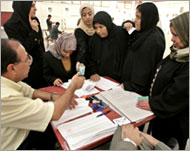More women for Palestinian parliament
A record number of women – including the wives and widows of notable political figures – will take up seats in the Palestinian parliament following January’s legislative elections.

Under a new quota system, the number of women deputies will increase to at least 13 within the 132-seat Palestinian Legislative Council (PLC), up from its current total of five.
Over the last year, an unprecedented number of women have stepped forward onto the political scene following parliament’s adoption in 2004 of a long-awaited quota system.
It guarantees them a greater level of participation in political life at both local and parliamentary levels. Many women have run in the ongoing municipal elections, the first in 28 years.
Impressive winning
In the first round, which took place in the West Bank a year ago, a record 139 women took part in the ballot and won 52 seats on local councils – nearly 17% of the total number of seats.
Similar results have been recorded in subsequent rounds.
A record number of women, many of them Islamists, are also expected to contest the parliamentary elections on January 25.
One of them is Rasha al-Rantissi, whose husband Abdelaziz al-Rantissi was assassinated by Israel last year.
 |
|
A record number of women are |
“Women in Hamas have played many roles, particularly in the municipal councils, so why not in the PLC?” al-Rantissi said.
“We have not seen the list yet, but all Hamas women are qualified to be on the list and be candidates of the PLC.”
Sources close to the Islamist resistance movement say the wife of senior Hamas official Ismail Haniyeh is also expected to run.
Media outlet
Wafa Abdel Rahman, director of media outlet Filastiniya and one of the activists who lobbied for the quota system, says some of those running for election are not necessarily advocating a women-centric agenda.
“Rasha al-Rantissi is not running as a woman but as the wife of somebody who was killed by Israel,” she said.
“She is running on the basis of her husband’s legacy. A women’s agenda is not part of [Hamas’] discourse.”
Al-Rantissi is looking to follow in the footsteps of the former minister Intisar al-Wazir, the widow of the PLO deputy leader Abu Jihad, who was assassinated in Tunisia by Israeli warplanes in 1988.
“We have been fighting since 2002 for a women’s quota system of 20% of PLC seats, so these elections are very important,” Abdel Rahman said.
“Women’s involvement in politics has definitely increased, but it is not about just having women represented, but about having women who can bring a women’s agenda to the table.”
Jailed leader
|
“Palestinian women need the training and the courage to reach the point where women are considered as no different from men on the political scene” |
Last week, Fadwa al-Barghuthi, wife of the jailed intifada leader Marwan al-Barghuthi, also announced she would run in this month’s local elections.
“Before the introduction of the quotas, very few women were involved in politics,” she said.
“But now, there will be more than a thousand women represented in the local municipalities because according to the law, every municipality must have two women.”
Women represent just over 47% of the 1.34 million registered voters in the Palestinian territories, and their entry into politics will definitely have an impact on the broader political picture, she said.
“This will certainly have an impact on Palestinian political regime because women represent half of the population in the Palestinian territories, and now we are represented in both the local and legislative councils.”
Although the introduction of a gender quota was a start, women needed the courage to get more involved in politics, Barghuthi said.
“Palestinian women need the training and the courage to reach the point where women are considered as no different from men on the political scene,” she added.